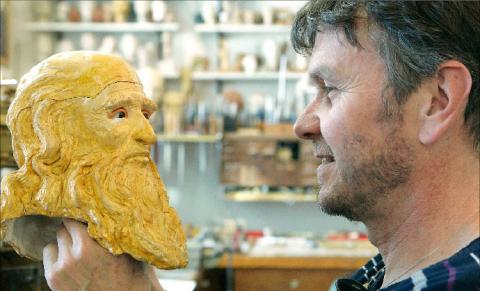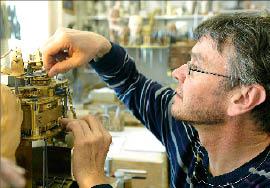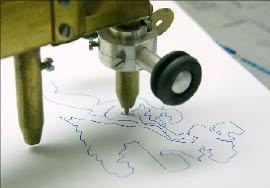Don’t let the retro look of the mechanical men built by Swiss artisan Francois Junod deceive you — they fascinate tech fans from Silicon Valley to Asia and will no doubt gain broader popularity after the launch of Martin Scorsese’s film Hugo about a secret hidden in an automaton.
The latest of Junod’s time-consuming projects is an 80cm wind-up Leonardo da Vinci figure that will be able to do intricate drawings and write mirror-inverted texts in Latin.
“I have been working on the sculpture for 10 years and on the mechanism for six years. I do not have a buyer yet so I can take my time,” Junod said, surrounded by a mishmash of tools, machines and sketches in his workshop in the village of Sainte-Croix perched high up in the Swiss Jura mountains.

Photo: Reuters
His most complicated creation so far, an Alexander Pushkin animated by a complex mechanism enabling it to write down 1,458 different poems, was bought last year by a Silicon Valley entrepreneur for a price kept secret.
“Complex models can take years of work and cost up to 1.2 million Swiss francs [US$1.32 million],” Junod said, proudly showing historical automata that collectors from around the world ask him to restore.
“Before, I mainly worked for Japanese clients because automata really have a tradition there, but today, I have customers from all around the world,” said Junod, who counts the Sultan of Brunei and the late Michael Jackson among his clients.

Photo: Reuters
Interest in these sophisticated dolls, known as automata, is likely to get a fresh boost from Scorsese’s new 3D film Hugo.
Based on a best-selling children’s book by Brian Selznick, the film tells the tale of a young boy in a Paris railway station in the 1930s who struggles to uncover a secret hidden in his father’s automaton.
“The film is going to be a good advertisement for my business,” Junod said. “People who watch it may think nobody makes automata anymore.”

Photo: Reuters
Good-humored, enthusiastic Junod, who went through some rough times when he started making the self-operating machines in 1984, is one of the last craftsmen specialized in an art serving no other purpose than to surprise with its complexity.
“That’s what makes automata different from robots, which normally have a practical purpose. They are poetic,” he said.
Junod wants to give his Leonardo da Vinci a transparent back to make the mechanism visible.
“It’s part of the fascination with automata that people can understand how they work. These days, ever more objects are beyond our comprehension,” he said.
Junod’s automata are animated by a complex wind-up mechanism, not unlike the one in a mechanical watch, allowing them to accomplish a precise programmed series of gestures, which has often triggered comparisons with our modern computers.
The roots of these surprising machines reach back to ancient Greece, but they had their heyday in the 18th century when a general fascination with artificial humans helped watch and automaton maker Pierre Jaquet-Droz’s work win the favors of French King Louis XVI and his wife, Marie-Antoinette.
Jaquet-Droz’s three masterpieces — The Musician, The Writer and The Draughtsman — are on display in a Neuchatel museum and will be part of a large automata exhibition next year.
Junod has made several automata for high-end watch brand Jaquet Droz, now owned by Swatch Group, which wants to revive this heritage and a closer partnership is in the works.
“The idea is that I develop prototypes that Jaquet Droz then produces in small numbers,” he said.
“That is what I love: developing new machines, rather than reproducing,” he said, remembering how he once declined late Swatch Group founder Nicolas Hayek’s offer to work exclusively for the world’s largest watchmaker.

MULTIFACETED: A task force has analyzed possible scenarios and created responses to assist domestic industries in dealing with US tariffs, the economics minister said The Executive Yuan is tomorrow to announce countermeasures to US President Donald Trump’s planned reciprocal tariffs, although the details of the plan would not be made public until Monday next week, Minister of Economic Affairs J.W. Kuo (郭智輝) said yesterday. The Cabinet established an economic and trade task force in November last year to deal with US trade and tariff related issues, Kuo told reporters outside the legislature in Taipei. The task force has been analyzing and evaluating all kinds of scenarios to identify suitable responses and determine how best to assist domestic industries in managing the effects of Trump’s tariffs, he

TIGHT-LIPPED: UMC said it had no merger plans at the moment, after Nikkei Asia reported that the firm and GlobalFoundries were considering restarting merger talks United Microelectronics Corp (UMC, 聯電), the world’s No. 4 contract chipmaker, yesterday launched a new US$5 billion 12-inch chip factory in Singapore as part of its latest effort to diversify its manufacturing footprint amid growing geopolitical risks. The new factory, adjacent to UMC’s existing Singapore fab in the Pasir Res Wafer Fab Park, is scheduled to enter volume production next year, utilizing mature 22-nanometer and 28-nanometer process technologies, UMC said in a statement. The company plans to invest US$5 billion during the first phase of the new fab, which would have an installed capacity of 30,000 12-inch wafers per month, it said. The

Taiwan’s official purchasing managers’ index (PMI) last month rose 0.2 percentage points to 54.2, in a second consecutive month of expansion, thanks to front-loading demand intended to avoid potential US tariff hikes, the Chung-Hua Institution for Economic Research (CIER, 中華經濟研究院) said yesterday. While short-term demand appeared robust, uncertainties rose due to US President Donald Trump’s unpredictable trade policy, CIER president Lien Hsien-ming (連賢明) told a news conference in Taipei. Taiwan’s economy this year would be characterized by high-level fluctuations and the volatility would be wilder than most expect, Lien said Demand for electronics, particularly semiconductors, continues to benefit from US technology giants’ effort

‘SWASTICAR’: Tesla CEO Elon Musk’s close association with Donald Trump has prompted opponents to brand him a ‘Nazi’ and resulted in a dramatic drop in sales Demonstrators descended on Tesla Inc dealerships across the US, and in Europe and Canada on Saturday to protest company chief Elon Musk, who has amassed extraordinary power as a top adviser to US President Donald Trump. Waving signs with messages such as “Musk is stealing our money” and “Reclaim our country,” the protests largely took place peacefully following fiery episodes of vandalism on Tesla vehicles, dealerships and other facilities in recent weeks that US officials have denounced as terrorism. Hundreds rallied on Saturday outside the Tesla dealership in Manhattan. Some blasted Musk, the world’s richest man, while others demanded the shuttering of his